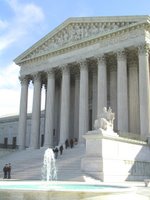 You can’t swing a dead cat these days without hitting a Supreme Court Justice in the media spotlight:
You can’t swing a dead cat these days without hitting a Supreme Court Justice in the media spotlight:
A-List legal blogs are red hot on a new book, Supreme Conflict: The Inside Story of the Struggle for Control of the United States Supreme Court,. In addition, interviews have come from Chief Justice John Roberts and Justice John Paul Stevens (ABC News) Justice Antonin “Get Over It” Scalia (Iona College), Justices Ginsburg (CBS 60 Minutes), Justice Alito, (Palm Beach Bar Association) and Justice Breyer (Fox News Sunday). Whew.
There is also a PBS special coming up next week.
According to Orin Kerr at The Volokh Conspiracy, “These days it feels like news when Supreme Court Justices aren’t giving on-the-record interviews to reporters.”
All of which leads to constitutional debate since many judges prefer to talk of judicial philosophy instead of individual cases: Some feel the constitution should be interpreted based on the current times and circumstances while others assert that it must be strictly interpreted as written.
This debate being played out now in various media brings up an ancient quote:
Rigorous law is often rigorous injustice.
–Terence (185 B.C – 159 B.C.)
Roman playwright and poet
